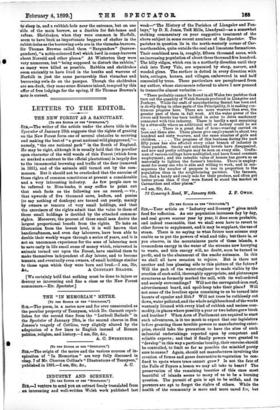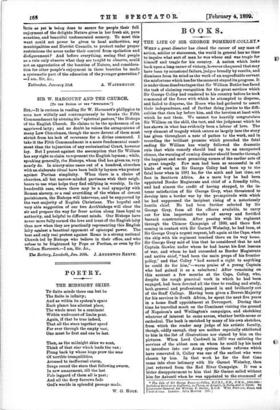(TO THE EDITOR OP THE "SPECTATOR:1
Slit,—Your article on " Industry and Scenery " gives much food for reflection. As our population increases day by day, and coal grows scarcer year by year, it does seem probable, and indeed reasonable, that we shall soon have to revert to other forces to supplement, and it may be supplant, the use of steam. There is no saying to what future uses science may enable us to put the powers of wind and tide; but there is, as you observe, in the mountainous parts of these islands, a tremendous energy in the water of the streams now hurrying to waste, and this energy will, no doubt, soon be turned to profit, and to the abatement of the smoke nuisance. In this we shall all have occasion to rejoice. But is there not another and less pleasing side to this picture of the future P Will the path of the water-engineer be made visible by the erection of such solid, thoroughly appropriate, and picturesque structures as formerly marked the mill, with its well-ordered and seemly surroundings ? Will not the corrugated-iron roof, advertisement board, and spoil-heap take their place? Will not some of the loveliest spots remaining to us be turned into haunts of squalor and filth ? Will not trees be ruthlessly cut down, water polluted, and the whole neighbourhood of the works wantonly littered with every kind of rubbish and useless com- modity, in places where possibly a year or two before grew birch and heather ? When Acts of Parliament are required to start such adventures, is it too much to expect that our legislators More granting those terrible powers to manufacturing enter- prise, should take the precaution to have the sites of such industrial undertakings reported upon by competent and reliable experts ; and that if finally powers were granted to "develop" in this way a particular locality, their exercise should be controlled, to limit as far as possible the mischief pretty sure to ensue ? Again, should not manufactures involving the creation of fames and gases destructive to vegetation be con- fined to spots where trees cannot grow ? Is not the fate of the Falls of Foyers a lesson we may all take to heart ? The preservation of the remaining beauties of this once most beautiful of islands seems to many of us to be a burning question. The pursuit of gain is apt to be selfish, and its pursuers are apt to forget the rights of others. While the health of the community is more and more cared for, but little as yet is being done to secure for people their full enjoyment of the delights Nature gives in her fresh air, pure sunshine, and beautiful undeseorated scenery. To meet this want could not power be given to local authorities, say municipalities and District Councils, to protect under proper restrictions the areas ender their control from spoliation and disfigurement ? And before everything, seeing that people as a role only observe what they are taught to observe, could not an appreciation of the beauties of Nature, and considera- tion for other people's enjoyment in those beauties be made a systematic part of the education of the younger generation ? —I am, Sir, &c.,



































 Previous page
Previous page